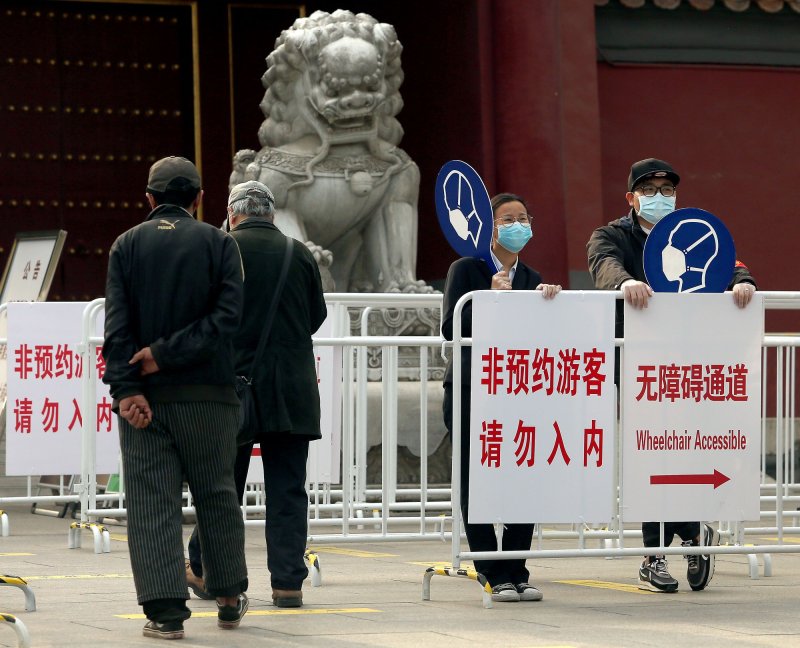Chinese volunteers make sure visitors to a park wear face masks amid reports of a decline in the threat of COVID-19 in Beijing on Tuesday. Photo by Stephen Shaver/UPI |
License Photo
April 9 (UPI) -- China has beefed up measures to prevent a second surge in coronavirus infections fueled by asymptomatic cases and those entering the country from abroad.
The Asian nation at the center of the global pandemic has seen a drastic decline in new cases from its peak of nearly 4,000 infections a day in early February to reporting single-digit local infections since the middle of March.
However, the country has been recording a growing number of imported cases for the past few weeks and on Thursday, Beijing's National Health Commission said of its 63 new cases over the day prior, 61 came from abroad for a total of 1,103 such cases since the outbreak began in its central city of Wuhan in December.
In response, China has closed all land border checkpoints with Russia.
The Chinese embassy in Moscow said in a statement late Wednesday that all ports of entry between the two countries were "temporarily closed."
The measure was implemented as Heilongjiang, China's northernmost province that borders Russia, reported 40 new imported coronavirus cases over Wednesday, all entering the country from its northern neighbor, China's state-run Xinhua reported.
The province also recorded 23 imported asymptomatic patients from Russia, for a total of 154 such infections from the country. The National Health Commission reported 56 asymptomatic cases for the whole country over Wednesday.
China only started reporting asymptomatic cases on April 1 and has registered 1,104 such cases, more than 360 of which were imported.
To stem the increase in cases of infections where patients do not exhibit symptoms, China's State Council recently approved measures to strengthen the monitoring of such patients.
The country published the new rules on Wednesday that mandate all medical and health institutions to report all asymptomatic infections within two hours of detection. The counties are then required to investigate all close contacts within 24 hours.
Asymptomatic cases will also be placed in quarantine for 14 days and will only be released following the expiration of that period and once taking two negative COVID-19 tests.
China's total infections climbed to 81,865 and its death toll from the virus climbed by two over Wednesday to 3,335, according to data from the commission.
The new figures came a day after the lockdown on Wuhan was lifted, ending a nearly 80-day quarantine of the city of 11 million people.
Meanwhile, as China attempts to prevent a second surge of infections, some countries were seeing progress in their battles against COVID-19.
In New Zealand, Prime Minister Jacinda Ardern marked the halfway point of the country's monthlong lockdown, stating during a press conference Thursday that they are "turning a corner."
"In the face of the greatest threat to human health we have seen in over a century, Kiwis have quietly and collectively implemented a nationwide wall of defense," she said. "You are breaking the chain of transmission. And you did it for each other."
She said her citizens were saving lives and they had prevented thousands of infections by staying home the last 15 days.
The island nation reported 23 confirmed cases of COVID-19 and six probable infections over Thursday, increasing its total to 1,239 coronavirus patients and one death. It was the fourth consecutive drop in cases.
Ardern said prior to the start of lockdown at the end of March, modeling showed New Zealand was on a similar trajectory as Spain and Italy, which have the world's second and third most cases of infection.
But she urged residents to keep abiding by the rules to prevent the virus from resurging.
"This is going to be a marathon," she said.
As part of preventing new cases, Ardern announced that starting midnight every New Zealander boarding flights to return home will be required to undergo a 14-day quarantine at a government-approved facility.
"As an island nation, we have a distinct advance in our ability to eliminate the virus, but our borders are also our biggest risk," she said.
Foreigners have been barred from entering the country since March 20.
Globally, the number of infections climbed to nearly 1.5 million by Thursday morning and nearly 88,500 deaths, with the United States the new epicenter of the virus with more than a quarter of all infections, according to a live tracker of the virus complied of government and medical data by Johns Hopkins University.















